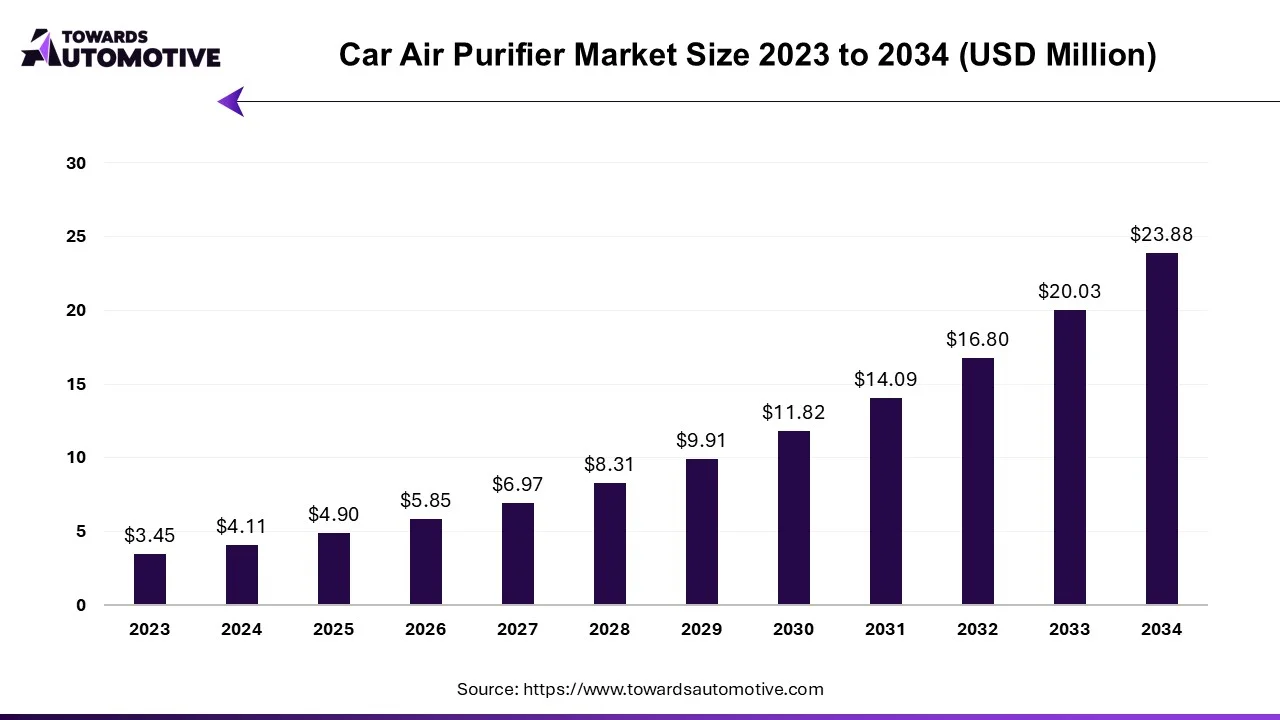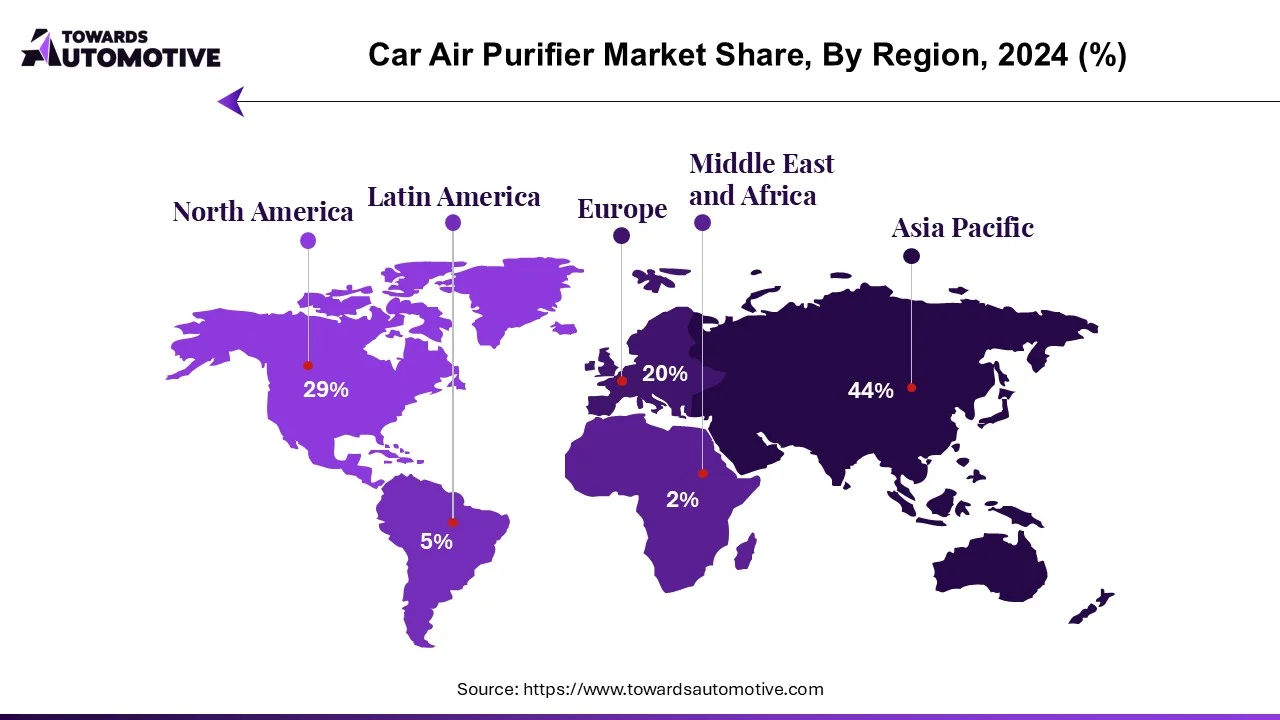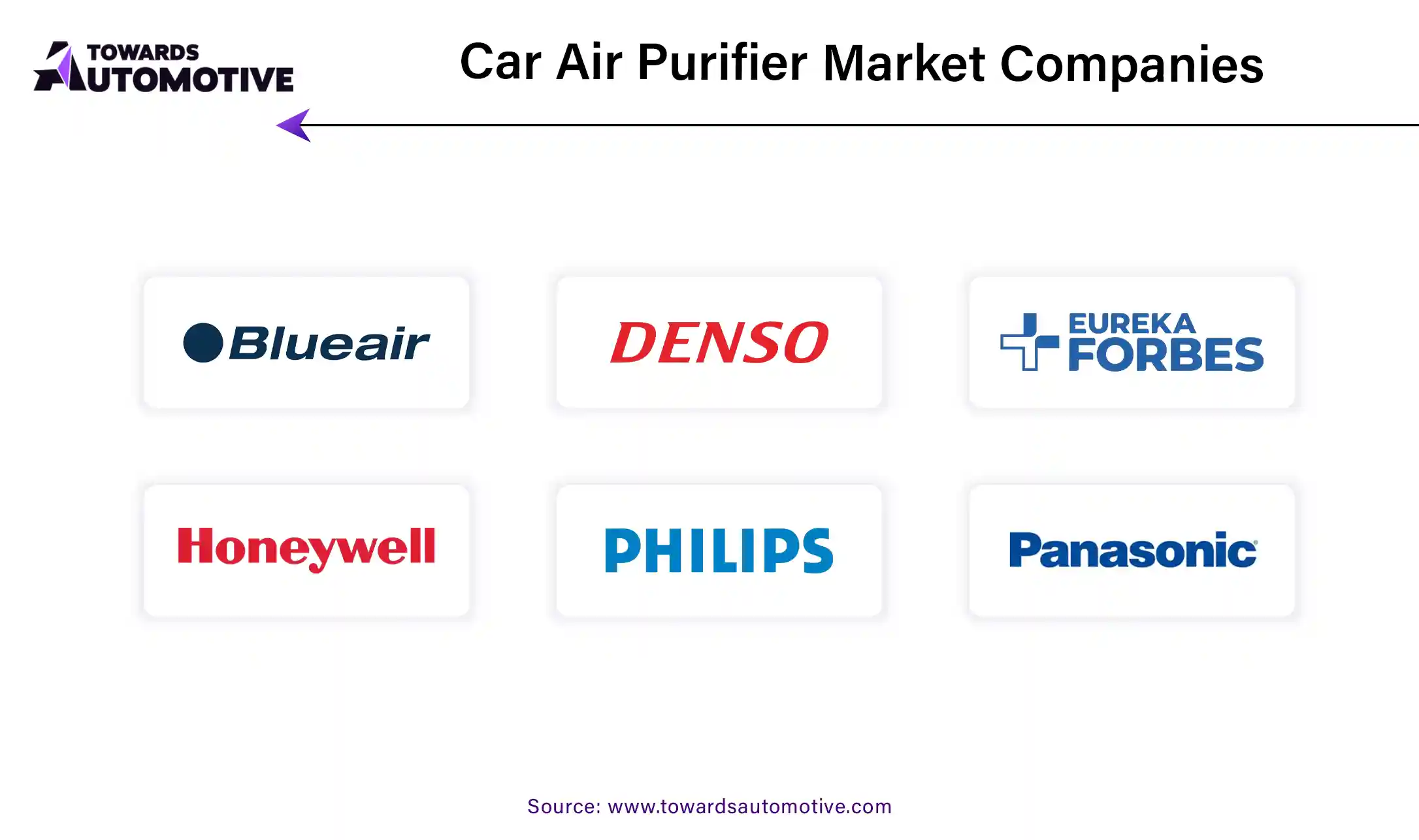April 2025
The car air purifier market is set to grow from USD 4.90 million in 2025 to USD 23.88 million by 2034, with an expected CAGR of 19.23% over the forecast period from 2025 to 2034.

Unlock Infinite Advantages: Subscribe to Annual Membership
The increase in global automobile production, as projected by the International Association of Automobile Manufacturers, signifies a growing market for car air purifiers. With more vehicles being manufactured, there is a larger pool of consumers who may be interested in improving the air quality inside their vehicles. This trend is driven by the increasing awareness of health and environmental issues among vehicle owners, who seek solutions to reduce pollution and allergens in their cars.
One of the key drivers of demand for car air purifiers is the rising interest in leisure travel. As more people embark on road trips and spend extended periods of time in their vehicles, they prioritize creating a comfortable and healthy environment inside their cars. Car air purifiers play a crucial role in enhancing the overall driving experience by addressing issues related to odors, pollutants, and allergens, thus making travel more enjoyable.
However, the high production cost of advanced air cleaning technology poses a significant challenge for the car air purifier market. While consumers recognize the benefits of these innovative products, they may be deterred by their high prices, especially in value-driven markets. To achieve mass adoption and sustainable growth, manufacturers need to strike a balance between innovation and affordability. This entails investing in research and development to improve technology while also implementing cost-effective strategies to make car air purifiers more accessible to a wider range of consumers. By addressing cost issues and offering competitive pricing, manufacturers can ensure the continued expansion of the car air purifier market in the face of growing demand.
The COVID-19 pandemic has indeed posed significant challenges for the auto air purification industry, primarily due to the adverse effects on vehicle production and sales. With automotive manufacturers facing disruptions in their production processes and supply chains, there has been a consequent reduction in the demand for automotive products, including air purifiers.
Economic uncertainty stemming from the pandemic has led to a decrease in consumer spending, further exacerbating the downturn in the market for auto air purification systems. As individuals and businesses alike navigate financial constraints and prioritize essential expenses, investments in non-essential vehicle accessories such as air purifiers have taken a backseat.
The decline in overall vehicle sales and production during the pandemic has also had ripple effects across the industry, impacting job growth and stability. With reduced demand for vehicles, manufacturers have scaled back their operations, leading to workforce reductions and challenges in sustaining employment levels.
However, despite these challenges, the auto air purification industry has demonstrated resilience and adaptability in responding to the pandemic's impacts. Some manufacturers have shifted their focus towards developing innovative solutions to address emerging needs, such as integrating advanced air purification technologies into vehicles to enhance passenger safety and health.
As the automotive industry gradually recovers from the disruptions caused by the pandemic, there is potential for a resurgence in demand for auto air purification systems. With a renewed emphasis on health and safety, consumers may prioritize investments in vehicle accessories that contribute to a cleaner and healthier driving environment. Moreover, as economic conditions stabilize and consumer confidence rebounds, the market for auto air purification systems is poised for recovery and growth in the post-pandemic era.
The automotive air purification industry is experiencing significant growth driven by advancements in display technology and continuous innovations in filtration technology, such as HEPA and carbon filters. These technological advancements have substantially enhanced the performance of air purifiers in vehicles, effectively removing particulate matter, allergens, bacteria, dust, smoke, and other pollutants from the air inside cars.
For Instance,
The growing market for car air purifiers is largely fueled by increasing concerns about allergies and air pollution. As individuals become more cognizant of the adverse effects of air pollution on health, there is a rising demand for solutions to purify the air inside vehicles. Car air purifiers address this need by providing a comfortable driving environment free from allergens and pollutants, thereby contributing to better overall health and well-being.
The heightened awareness of health-related issues has underscored the importance of the automotive air purification industry. As consumers prioritize measures to mitigate the impact of allergens and pollution in their vehicles, the demand for car air purifiers continues to surge. This trend highlights the significance of the consumer market in driving the adoption of air purification solutions in vehicles and underscores the industry's pivotal role in promoting healthier and more sustainable driving environments.
The HEPA segment is poised to dominate the automotive air purifier market, capturing over 60% of the market share by 2022. This dominance can be attributed to the effective filtration capabilities of HEPA (High-Efficiency Particulate Air) filters, which can capture dust, pollen, and various pollutants with high efficiency. HEPA filters are particularly beneficial for individuals with allergies or respiratory sensitivities, as they help create a healthier environment inside vehicles by removing harmful substances from the air. As awareness of the effectiveness of HEPA filters in improving air quality continues to grow, the demand for automotive air purifiers equipped with this technology is expected to surge significantly throughout the forecast period.
In terms of distribution channels, the market-based segment is expected to account for approximately 78% of export-led auto sales in 2022. This growth can be attributed to the importance of consumer preferences and professional services offered by brick-and-mortar stores. By providing customers with hands-on experience, physical retail outlets enhance trust and credibility by allowing individuals to interact with and test air purifiers before making a purchase. Additionally, store personnel offer expert guidance, address customer inquiries, and assist in the selection process based on the specific requirements of each vehicle. This personalized interaction fosters customer satisfaction and positions physical retail outlets as the preferred choice for individuals seeking immediate assistance and product information in the automotive air purifier market.

By 2022, the Asia-Pacific region is poised to dominate the automotive air purifier market, capturing a substantial 42% share of the total revenue. This significant market presence can be attributed to the region's rapid advancements in car air purification technology, which have notably enhanced the quality of air within vehicles and spurred industry growth. These advancements have enabled the development of advanced car air purifiers that effectively remove pollutants, odors, bacteria, viruses, mold, and various airborne allergens, thereby ensuring a cleaner and healthier interior environment for vehicle occupants.
A notable example of innovation in this sector is the introduction of the Cabin Pl and Pli car air purifiers by BlueAir in June 2021. These cutting-edge air purifiers have undergone rigorous testing and have been proven to remove over 99% of fine aerosols and car exhaust pollutants. BlueAir's commitment to quality is further evidenced by the products' adherence to international standards for air quality, ensuring that they meet stringent performance and safety requirements.
The launch of these advanced car air purifiers underscores the industry's dedication to addressing air quality concerns and improving the overall driving experience for consumers. As awareness of the importance of clean air in vehicles continues to grow, particularly in densely populated regions like Asia-Pacific, the demand for high-performance automotive air purifiers is expected to surge. This trend is poised to drive significant market expansion in the region, further solidifying its position as a key player in the global automotive air purifier market.

The major companies operating in the car air purifier industry are:
The introduction of high-pressure air systems into cars represents a significant innovation in the automotive air purifier market, with major players vying for revenue in this segment. These advanced systems are designed to eliminate disease-causing pathogens and enhance air quality within vehicles, reflecting the industry's dedication to technological advancement and customer satisfaction. By prioritizing the development of solutions that promote a clean and healthy car environment, manufacturers are meeting the evolving needs and preferences of consumers who place a premium on their well-being while traveling.
The integration of high-pressure air systems into cars underscores the industry's commitment to combating airborne contaminants and improving overall air quality. These innovative solutions leverage cutting-edge technology to deliver superior performance and effectiveness in purifying the air inside vehicles. By removing disease-causing pathogens and other harmful particles, such as allergens and pollutants, these systems help create a safer and more hygienic environment for vehicle occupants.
The emphasis on technological innovation in automotive air purifiers reflects the industry's response to evolving consumer expectations and regulatory requirements. With an increasing focus on health and wellness, consumers are seeking vehicles equipped with advanced air purification systems that provide added protection against airborne threats. Major players in the market are leveraging this demand to differentiate their offerings and gain a competitive edge in the industry.
Introduction of high-pressure air systems into cars represents a significant milestone in the evolution of automotive air purifiers. By prioritizing disease elimination and air quality improvement, manufacturers are not only meeting the needs of today's consumers but also shaping the future of in-vehicle environmental control. As the market continues to evolve, innovation in this space is expected to drive further growth and development, ultimately benefiting both manufacturers and consumers alike.
By Technology Type
By Geography
April 2025
April 2025
April 2025
March 2025
We offer automotive expertise for market projections and customizable research, adaptable to diverse strategic approaches.
Contact Us